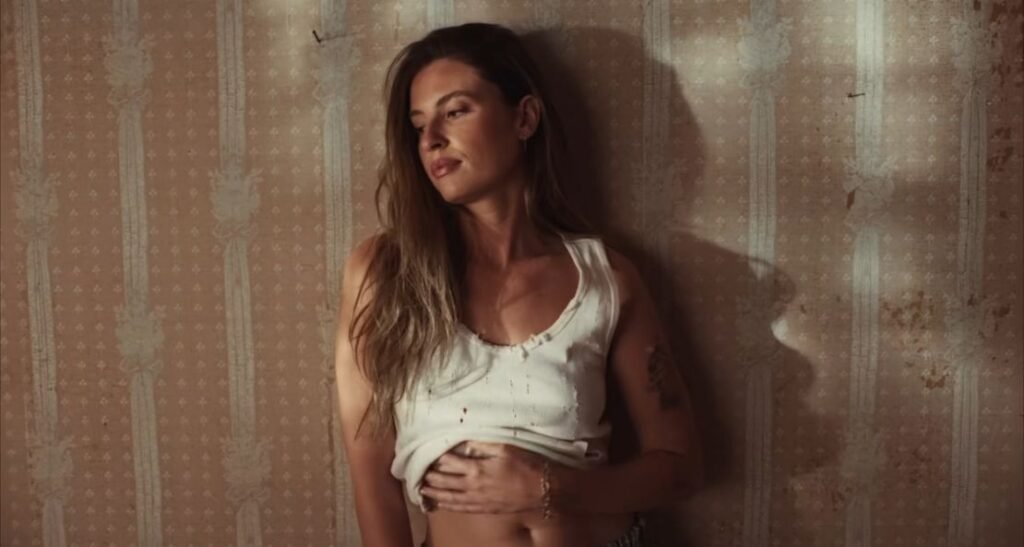A Song That Sparked a Storm
When Fletcher released Boy on June 5th, 2025, she didn’t just drop a song—she detonated a conversation.
The track, sparse and contemplative against her usual dynamic output, finds the singer-songwriter grappling with an unexpected romantic revelation that has left both her and her fanbase questioning everything they thought they knew.
Stripped Back and Vulnerable
Boy strips away the polished pop sheen that defined much of Fletcher’s earlier work, opting instead for a deliberately intimate production.
The track opens with fingerpicked acoustic guitar, each note hanging in the air like a confession waiting to be heard.
It’s country-tinged without being overtly so—more like overhearing someone’s diary entry than witnessing a performance.
The production feels intentionally unadorned, as if anything more elaborate might overshadow the weight of what’s being said.
Soft strings swell behind the chorus, but they never overwhelm the central guitar-and-voice arrangement.
Even the drums, when they finally appear, feel like heartbeats rather than percussion—steady, nervous, alive.
Line by Line: Parsing the Confession
“I’ve been sitting on a secret / And I don’t think I can keep it anymore”
There’s vulnerability from the jump. No poetic flourish. Just Fletcher admitting she’s been hiding something, and her delivery feels more exhale than exposition.
The fingerpicked guitar echoes this restraint, giving the lyric a sense of whispered urgency.
“I’ve been hiding out in Northern California / Where nobody knows who I was before”
A quiet relocation both physically and emotionally. The anonymity becomes a shield.
The phrase “who I was before” suggests a fundamental shift in self-perception, not just circumstance.
The production stays skeletal here—just enough space to let the line breathe.
“Where they won’t judge in the morning”
This line carries particular weight. The “morning” reference suggests intimate encounters, but also the harsh light of day when masks come off and reality sets in.
It’s about finding a space free from the judgment of those who knew her previous self.
“We were counting down, the music stopped / We were waiting for the ball to drop”
The New Year’s Eve setting isn’t accidental—it’s a moment when time literally restarts, when resolutions are made and old selves are shed.
The image of waiting for the ball to drop mirrors her own internal countdown to this moment of revelation.
Then comes the pivot:
“I closed my eyes and I leaned in / I kissed a boy”
It’s cinematic in pacing, but there’s a chill beneath the soft melody.
The simplicity of this line is devastating. After all the buildup, the actual moment is described with childlike directness.
The kiss isn’t framed as euphoric; it’s hesitantly monumental.
The vocal delivery is clear but cautious, as if she’s still processing it herself.
“And I know it’s not what you wanted to hear / And it wasn’t on your bingo card this year”
Fletcher directly addresses her audience here, acknowledging their expectations and investment in her previous narrative.
The “bingo card” reference feels slightly dated but endearingly honest—like someone trying to make light of something heavy.
The chorus rises slightly in dynamics, but never overreaches. It’s emotional without being explosive.
“Well, it wasn’t on mine / I fell in love”
This admission—that she surprised herself as much as anyone else—cuts to the heart of the song’s authenticity.
Love, the line suggests, doesn’t follow our carefully planned narratives.
“And it wasn’t with who I thought it would be / And I’m scared to think of what you’ll think of me”
The vulnerability here is almost painful. A public figure admitting fear about audience perception feels both brave and slightly tragic—the cost of living authentically in the spotlight.
“His lips were soft / I had no choice, I kissed a boy”
That physical detail—”his lips were soft”—grounds the abstract concept of unexpected attraction in sensory reality.
But “I had no choice” is the line’s emotional center, suggesting both the inevitability of attraction and perhaps a surrendering of agency to feeling.
Embracing Confusion Without Apology
“Laying my cards on the table / I’ll admit I don’t know how to label it”
She shrugs off definitions in favour of honesty. The lyric doesn’t aim to resolve confusion—it embraces it. That same ethos carries through:
“You can think that I’m a hypocrite, that’s cool / I’m just following my heart, is what it is”
Rather than rebuffing critics, she lets the line land without rebuttal. This isn’t about convincing anyone—it’s about documenting her own contradictions.
“Maybe I’ve changed or maybe it’s just him / But I leaned in and kissed a boy”
There’s no resolution, only reflection. The instrumentation expands just enough to let the weight settle, then returns to its sparse foundation.
Audience Reaction and the Politics of Identity
The response to Boy has revealed the complex relationship between artists and their audiences in 2025.
One observer noted the particularly awkward timing: “Choosing to drop this album right in Pride month shows humility for the community who built who she is.”
The sentiment captures a widespread feeling that Fletcher’s revelation, while valid, felt tone-deaf given the current political climate.
Others pushed back against what they saw as biphobic reactions: “Coming out as dating a man… girl you’re so brave,” written with obvious sarcasm, reflects the frustration some feel with treating heterosexual relationships as brave revelations during a time when actual LGBTQ+ rights are under attack.
Perhaps most tellingly, many fans expressed feeling that Fletcher was “now just like any other female artist,” suggesting that her queerness had been central to her appeal—and that dating a man somehow diminished that appeal.
What makes Boy particularly fascinating is how it functions as both confession and apology.
Fletcher doesn’t just reveal her feelings; she apologises for them. The repeated “I had no choice” suggests someone seeking absolution rather than celebrating discovery.
This apologetic stance has drawn criticism from some quarters. As one listener put it: “It reframes lesbians/queer people as the boogeyman as though coming out as bi to her queer fans holds the same weight and danger that coming out as non heteronormative to a heteronormative society has.”
The observation cuts to a crucial tension: in a world where queer people face real persecution, what does it mean to frame a heterosexual relationship as something requiring courage to reveal?
The Sound of a New Narrative

Boy represents a significant sonic departure for Fletcher, whose previous hits like Becky’s So Hot and Cherry (featuring Hayley Kiyoko) were built on bold, confident production and unapologetic queer desire.
The shift to this more subdued, country-inflected sound mirrors the internal shift she’s describing—it’s the sound of someone questioning their own narrative.
The production choices feel deliberate in their restraint. Where her previous work often felt anthemic, Boy feels conversational.
It’s less interested in making you dance than in making you listen.
Beyond Labels: Visibility and Representation
Fletcher has always identified as queer rather than lesbian, but Boy forces a conversation about bisexual visibility and representation.
Statistics suggest that bisexual people make up the majority of the LGBTQ+ community, yet bisexual women in particular often find their sexuality questioned when they date men.
The song arrives at a moment when bisexual representation in music is both increasing and contentious.
Artists like Demi Lovato and Dove Cameron have navigated similar terrain, but few have made their uncertainty the centerpiece of the artistic statement itself.
Perhaps the heaviest burden Boy carries is representational. Fletcher built a career that provided much-needed visibility for sapphic relationships, and some fans clearly feel betrayed by this pivot.
As one listener observed: “If there was a lot of representation for lesbians, no one would care if you kissed a boy. But the thing is lesbians have a very few artists they can relate to.”
This speaks to a larger issue in LGBTQ+ representation: when there are so few visible queer artists, each one carries outsize responsibility for an entire community’s visibility.
An Honest Mess
Boy succeeds not despite its uncertainty but because of it. In an era of increasingly performative authenticity, Fletcher offers something rarer: genuine confusion about her own identity and feelings.
The song doesn’t provide answers—it asks questions, and sometimes the questions are more honest than the answers.
Whether Boy represents a temporary exploration or a permanent shift remains to be seen.
What’s certain is that Fletcher has created a document of a moment when life refused to follow the script, when attraction surprised even the person feeling it.
In a world that demands clear categories and unwavering identities, Boy offers something more human: the messy, complicated truth of a heart that doesn’t always know what it wants until it finds it.
The song may not satisfy everyone who hears it—some will find it too apologetic, others will question its timing, and still others will mourn what it represents. But perhaps that’s the point.
Real life rarely satisfies everyone, and real feelings don’t wait for convenient moments to arrive.
Boy is the sound of someone choosing honesty over comfort, even when that honesty comes wrapped in uncertainty and fear.
In the end, that might be the bravest thing of all.
You might also like:
- Decoding Tate McRae’s Greedy: A Deep Dive into the Lyrics and Meaning
- If We Ever Broke Up: Mae Stephens’ Breakup Anthem
- Lana Del Rey’s 57.5 Isn’t a Secret — It’s a Spark Meant to Start Fires
- Do I Wanna Know? by Arctic Monkeys: Exploring Lyrics, Meaning, and Cultural Impact
FLETCHER Boy Lyrics
Verse 1
I’ve been sitting on a secret
And I don’t think I can keep it anymore
I’ve been hiding out in Northern California
Where nobody knows who I was before
Where they won’t judge me in the morning
Pre-Chorus
We were counting down, the music stopped
We were waiting for the ball to drop
I closed my eyes and I leaned in
I kissed a boy
Chorus
And I know it’s not what you wanted to hear
And it wasn’t on your bingo card this year
Well, it wasn’t on mine
I fell in love
And it wasn’t with who I thought it would be
And I’m scared to think of what you’ll think of me
His lips were soft
I had no choice, I kissed a boy
Verse 2
Laying my cards on the table
I’ll admit I don’t know how to label it (Oh)
You can think that I’m a hypocrite, that’s cool
I’m just following my heart, is what it is (Mm)
And only time will tell
Pre-Chorus
If I will or won’t do this again
Maybe I’ve changed or maybe it’s just him
But I leaned in and kissed a boy
Chorus
And I know it’s not what you wanted to hear (Oh)
And it wasn’t on your bingo card this year
Well, it wasn’t on mine
I fell in love (I fell in love)
And it wasn’t with who I thought it would be (Oh)
And I’m scared to think of what you’ll think of me
His lips were soft
I had no choice, I kissed a boy
Interlude
Ooh
Da-da-da, da-da-da-da-da
Ooh
Da-da-da, da-da-da-da-da
Outro
I kissed a boy
And I know it’s not what you wanted to hear
And it wasn’t on your bingo card this year
Well, it wasn’t on mine
I kissed a boy


